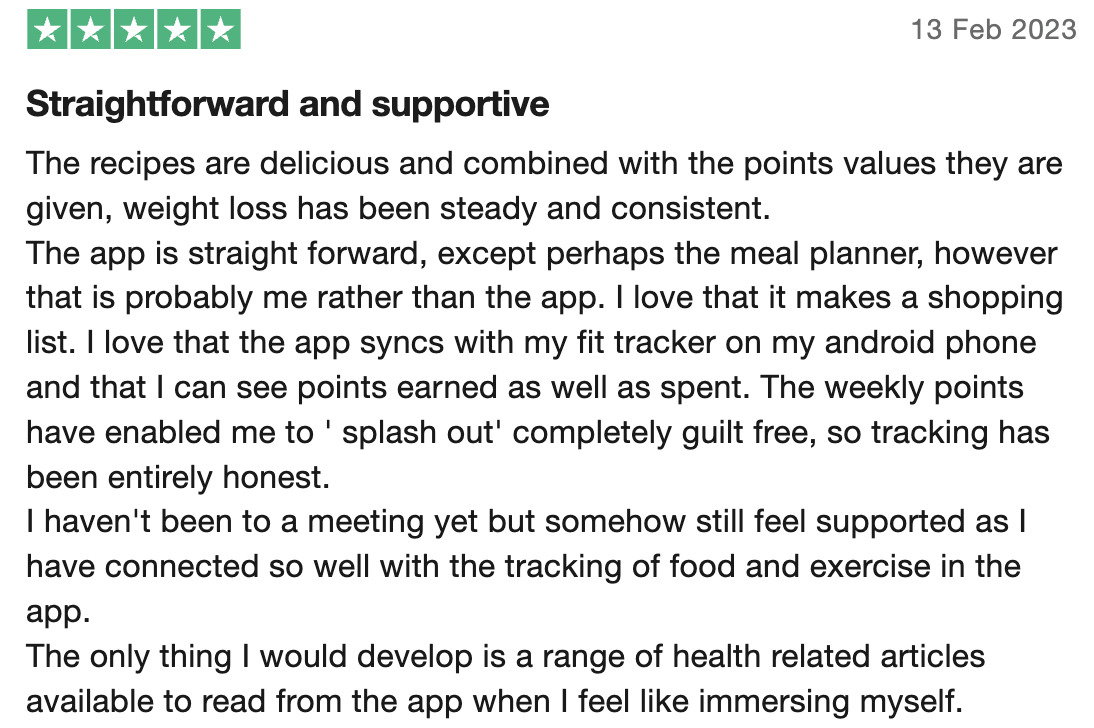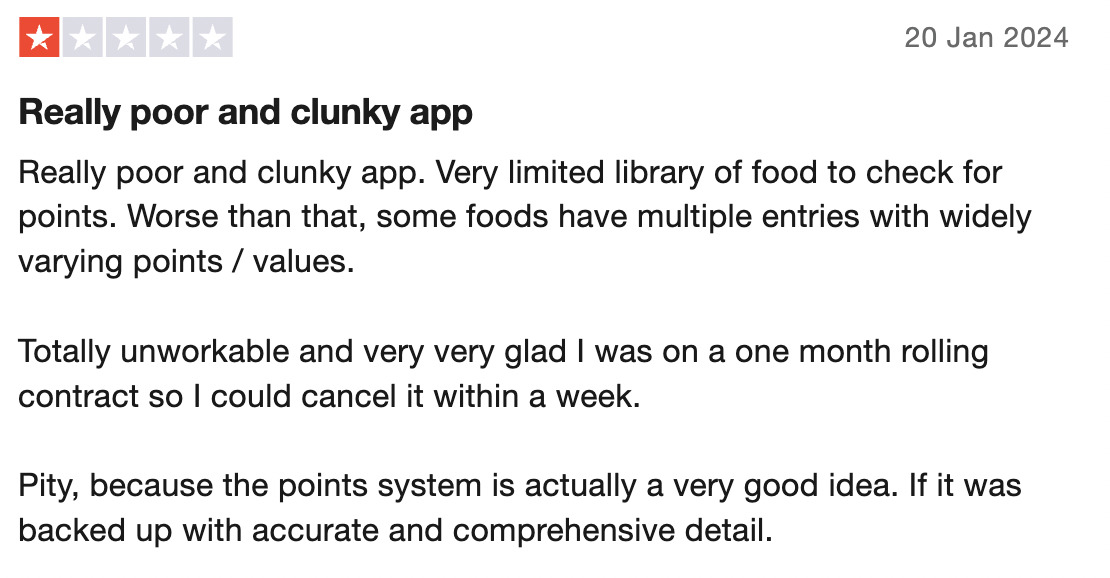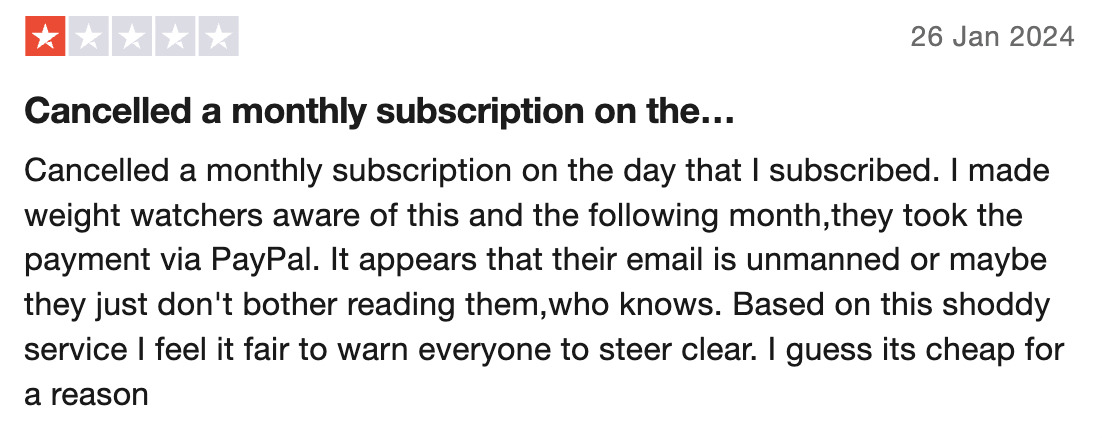Weight Watchers is a weight loss programme that has been around since the 1960’s. It provides users with a certain amount of Points, with all foods given a number of Points, and the aim is to eat within the Points, with the goal of weight loss.
Weight Watchers rebranded to WW in 2018, standing for ‘Wellness that Works’. The principle of the Points system is to create a calorie deficit, essentially the basis of all diets, to aid weight loss.
What is Weight Watchers?
Weight Watchers is a style of weight loss programme, based on eating within the number of Points assigned to you. All foods are given a certain number of Points, and as long as you eat within the Points, you are following the guidance. It has evolved and rebranded over the years, now being called WW, standing for ‘Wellness that Works’. This idea is to move away from the idea of WW being known as a ‘diet’ and more of a ‘wellness lifestyle programme’. With this rebrand, factors such as mindset, exercise and sleep are also looked at, though at the end of the day, it is still a form of a diet.
The Points are allocated based on a persons weight, hight, age and activity level. The Points are designed to allow you to track what you eat, with all foods given a certain number of Points. The idea is to meet this allocated number of Points, without going under or over the number. It is encouraged to log food via the WW app, which also provides virtual support.
Since the rebrand, the Points system is still there, though some changes have been made, to allow a number of foods to be given zero Points. For example, avocado and potato are now zero Points – which for some can be confusing, if you are unsure of how to manage these within your calorie goals, as all foods still contain calories.
There are thousands of weight watchers reviews available, some showing overwhelmingly positive results with using the Point system, though others have noted finding counting Points can be restrictive and potentially cause unhealthy views on certain foods with higher Points. People may also under-eat earlier in the day to save up Points, where they end up binging or over-eating later, which does not create a healthy relationship with food.
How does Weight Watchers (ww) work?
WW works on a Points system. Each user is allocated a certain number of Points based on their goals, calculated by the app. This is a daily Points budget, that the user should meet each day. Each food and drink is given a certain number of Points. No foods are excluded or banned, but there are some foods that are higher in Points which will need to be consumed sparingly or in small amounts. Foods that are lower calorie are likely to provide less Points, and therefore are encouraged to eat more often. Weight Watchers reviews mention the Points system can make it easy to stick to a certain number per day, instead of focusing on calories. Though this is essentially still a form of tracking, which can impact our overall relationship with food.
What is Weight Watchers Points?
The Weight Watchers Points are the specific numbers assigned to each food or drink. They use the foods calories and nutritional value and turn it into a number called the Points value. They claim that the healthier the food is, the fewer Points it will have.
The number of Points a food or drink has, is based on several factors. Calories are used as a start, as well as fat and type of fat content. If a food has more saturated fats or more sugar, this will give it higher points. A food that provides a good quality protein source will reduce the points. Users are also able to manually enter nutritional data on certain foods that are not provided in the app already, to help calculate the points for that item. This can be helpful when designing recipes.
When using the app, you will be provide with a customised Points budget, to ‘spend’ throughout the day, on any foods or drinks. You need to track this all in the app, to help record the number of Points consumed. WW state that as long as you stay within your Points budget, weight loss will occur.
Pros and Cons of Weight Watchers
| Pro’s | Con’s |
| Points are unique and personalised based on your goals, also considering tracked activity | Counting Points is essentially another form of restriction, the basis of all diets |
| App provides meal planning tools with a wide range of recipes, on demand workout routines and meditations | Costly ongoing membership price, with optional add-ons for further support or features costing more |
| Support given as part of online and in person communities, with other WW users and health coaches | Weekly weigh ins are required to track progress in the app |
| Promoting slow and steady weight loss | Some may find the app provides too much freedom without structure, and can struggle to stick to the Points |
| No food are off limits or banned | Can lead to saving up points earlier in the day, to allow overeating later, which creates unhealthy habits, such as restriction and binging |
| Short term effectiveness shown in research | Does not ensure you are having a balanced diet, if foods are based off Points and not specific nutritional requirements |
| Members- only online community available | Some features are only accessible via the premium plan, such as the Wellness Workshops, leading to higher costs |
| Barcode scanner for easy tracking | Food guilt can be attached to eating foods with higher Points, or going over Points allocated |
| You can also add Points by practicing healthy habits such as drinking water and eating vegetables. However, this gives the mindset that you have to ‘earn’ your food, which causes issues in the long term. | |
| The programme does not teach about listening to hunger and fullness cues, or looking at the nutritional composition of foods, only as Points values. This does not actually teach you about the nutrient composition of foods or how different foods may impact your hunger, fullness, or overall health. |
What can you eat on Weight Watchers plan?
With the Weight Watchers plan, there are plenty of foods to choose from. The programme does not ban certain foods, which means that all foods are allowed, although it is important to keep to your daily allowance of Points.
Most foods with ZeroPoints or low points include:
- Fruits such as oranges, apples, pears, berries
- Vegetables such as cucumber, peppers, asparagus, courgette and carrots
- Most lean proteins such as skinless chicken, tofu and eggs, seafood and shellfish, fat free and plain yoghurts and cottage cheese
- Some whole grains and high fibre foods, such as brown rice, plain corn and oats
- Plenty of herbs and spices
- Drinks such as water, tea & coffee (no milk or sugar), diet sodas and flavoured waters with sweeteners.
Foods with small number of points include:
- Fruits such as avocado and coconut
- Vegetables such as plantain and cassava, yam, potatoes and sweet potatoes
- Olives
These foods are encouraged to be included often, though some foods are not given specific portion guidance, which means it can be easy for some users to over consume on these ZeroPoint foods and drinks, as they do not count towards their daily Point allowance.
Foods to limit on Weight Watchers plan
Although there are no specific foods to eliminate, there are certain foods that are discouraged, due to them being higher in saturated fats, added sugars or salts. These foods are typically much higher in Points, meaning there is a certain limit to how many of these foods someone can consume.
Higher Point foods include:
- Sugar sweetened beverages such as soft drinks
- Sweets and chocolate, including cakes and biscuits
- Processed foods, including processed meats like ham or bacon
- Salty snacks such as crisps
Real examples of Weight Watchers plan
Each plan is based on the Points system, and this is individualised to the user, depending on several factors, including their age, weight, gender and activity levels.
Average daily Points are usually between 20-30 Points.
If you were given 25 Points per day, this could be an example day of eating:
- Breakfast: Banana pancakes, made with banana, wholewheat flour and egg = 3 Points per serving.
- Lunch: Chicken & greens sandwich, made with chicken breast, mustard, celery, avocado, lettuce and 2 slices of wholegrain bread = 7 Points per serving.
- Snack: Lemon muffin, made with oats, egg, lemon, sugar and almond milk = 2 Points per serving.
- Dinner: Spaghetti bolognese, made with pasta, lean beef mince, vegetables and tomato sauce = 9 Points per serving.
- Dessert: Flourless chocolate pudding, made with almond flour, sugar, banana, egg and yoghurt = 4 Points per serving.
You can earn additional Points by tracking healthy activities and also roll over Points to the next day, if you did not consume them all on one day.
Can Weight Watchers help to lose weight?
Weight Watchers has a slow and steady weight loss approach, where it explains that members can expect a loss of 0.5-2lbs (0.2-0.9kg) per week, depending on their plan. This makes it feel like a sustainable approach rather than a quick fix, as all foods are allowed, based on their Points system.
There have been many short term studies that have shown Weight Watchers to be effective for weight loss. For example, a study published in 2020 found that 152 people with obesity were able to lose almost 6% of their body weight after 3 months following Weight Watchers, with one third of the group losing over 10% of their body weight after 6 months.
A detailed systematic review looking at 12 month weight loss using Weight Watchers compared to other weight loss programmes, found that after 12 months, Weight Watcher participants lost at least 2.6% more weight compared to those in the control group. However, subjects that followed Jenny Craig, another popular diet, had a greater weight loss of at least 4.9% after 12 months, compared to control. Keep in mind that these are still considered short term studies, and the longer term effect of these diets have not been fully considered or researched yet.
How Much Does Weight Watchers Cost?
Weight Watchers offers different tiered plans depending on what a user wants and how much support they might like.
The Core plan is the least expensive, and includes personalised Points allocation, recipes for inspiration, as well as ability to track progress. Workshops are not included in this price.
On a month by month rolling contract, it is £18.95/month
A 3 month rolling contract is £15/ month
A 6 month rolling contract is £10/month
The Premium plan includes everything in the Core plan, but also supportive coach-led Workshops, either in person or virtually, to allow users to learn behaviour change, as well as unlimited support from other WW members.
On a month by month rolling contract, it is £26.95/month
A 3 month rolling contract is £20/ month
A 6 month rolling contract is £15/month
What is the success rate with Weight Watchers?
Research has been carried out over the years to show the success of Weight Watchers.
A national audit of almost 30,000 people who were referred to Weight Watchers, were able to show consistent outcomes when WW was used in health practises – with a third of those referred losing at least 5% weight after a 12 session course. Keeping in mind that only 54% of the courses were completed, however this was the largest audit of NHS referral to a weight loss programme in the UK.
Weight Watchers is used globally and has been found to produce significant weight loss, with at least 5% of body weight loss. Out of 141 commercial weight loss programmes studied in the USA, WW was identified as one of two programmes (along with Jenny Craig) that was recommended to be prioritised by clinicians for referral, due to sustained weight loss between 6-12 months. The study looked at 39 previous randomised control trials with data over 12 months. It showed that WW participants were able to achieve at least 2.6% greater weight loss compared to those in the control group. However, Jenny Craig resulted in at least 4.9% greater weight loss at 12 months compared to control groups.
Weight Watchers compare with others
We looked at several other popular weight loss or wellness programmes offered in the UK and compared them to Weight Watchers in a number of different areas:
| Cost | Support provided | Brief outline | What else is offered | |
| Weight Watchers (WW) | Between £10-18.95 a month for the Core programme, or £15- £26.95/month for the Premium programme | Group coaches are provided, especially for those on Premium programme. Not dietitians or registered nutritionists. | Using personalised Points system to track foods eaten and staying within your points | Thousands of recipes, group support provided for motivation and accountability, as well as logging of exercise, stress and sleep quality |
| Slimming World (SW) | Between £60-80 for 3 months digital support, depending on type of membership. | Group support via a Slimming World Consultant, who are previous SW members, not registered dietitians or nutritionists | Food optimising – eating more filling proteins, fruits & vegetables (Free foods and small amount of ‘syns’, which are occasional treats | Membership will provide SW recipes, meal plans and other weight loss tools |
| Noom | Between £14-56 per month, depending on auto-renewing plan selected | Coaches are a part of the programme, not dietitians but they have been through their own training called ‘Noomiversity’ | Daily tracking of foods based on their calorie goals. Foods are colour coded, depending on nutritional value. | Short daily videos to help support behavioural change over the 16 week programme |
Weight Watchers online reviews
Weight Watchers UK reviews are currently at 2.9 out of 5 on Trustpilot. There are almost 4,000 reviews, with some of the latest reviews commenting on how the barcode scanner feature on the app allows the user to check if items in store are suitable on the plan. Others also have found that they are losing weight without feeling hungry and feel healthier when eating out, being able to see Points related to certain foods.

However, others have struggled with navigating the app, commenting on the limited library of foods available, and struggling with constant app issues. Some find that the online meeting times do not suit their needs, and there is no flexibility within that. Many reports on how users have requested to cancel their monthly membership, only to find that payment has auto-renewed, meaning that the route to cancellation can be difficult and frustrating.


Weight Watchers Real Experiences
Several Weight Watchers users have shared their real experiences online. Willow started with WW the Christmas of 2019, at 21 stone. Willow also had been diagnosed with fibromyalgia and was struggling with mobility issues. After attending the first workshop, we went into lockdown, so Willow used the app and recipes to help make changes with their son at home. Willow has lost over 100lbs since joining and has now become a WW coach themselves!
Another user named Pai, has been able to lose over 3 stone since using the programme from 2020. They have also found the workouts on the app a helpful part of this journey, as well as the virtual events and cook-alongs.
Is Weight Watchers worth it?
The Weight Watchers programme is aimed at helping people to lose weight. It has shown from previous research that this has been achievable when the programme is followed as outlined, though there are some drawbacks that we do not agree with.
For example, the coaches that support on the app are said to be ‘experts on the WW programme and behaviour change’. However, they are not experts in nutrition, as Registered dietitians and nutritionists are. No prior qualifications are needed to be a WW coach.
There is such a value on the Points system and also a focus on a weekly weigh in. This can create an unhealthy relationship with food choices as well as the scales and body weight. Food is more than just points, food is for pleasure and enjoyment, and we encourage clients to be able to include all foods, without attaching numbers or points to their value. In the long term, using Points can create unhealthy food rules, with people more likely focusing on low Point foods, ending up severely restricting higher Point foods, ending up possibly then binging on these foods when it becomes too hard to maintain.
Instead of focusing on the restriction of certain foods that are higher in Points, working with a registered dietitian can explore your relationship with foods, what is best for you on a personalised level based on extensive analysis of your lifestyle. Exploring the root causes of weight gain or struggles with our relationship with food is something that can be explored in depth in one to one sessions, when working with an experienced nutritional professional, such as a private dietitian.







